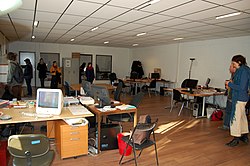Belgian Indymedians discuss participatory journalism at open door day
Monday, February 18, 2008


Volunteers and interested people could visit the Belgian Indymedia headquarters in Brussels on Sunday during their second open door day. Around 50 people came to hear about the organisation's evolution during 2007 and what's coming up for 2008. A book about citizen journalism, with contributions from both mainstream journalists and several alternative media experts, was also presented. And the Indymedians mingled, with loungy Creative Commons music in the background.
Indymedia.be was founded in 2000, only a few months after Indymedia's inception at the alter-globalist protests at the World Trade Organisation's summit in Seattle. This made them the first Indymedia on the European mainland. The Independent Media Center's trademark is politically left, social reporting. The initial growth was slow, but during 2007, the organisation grew to around 110 regular contributors, with the first steps towards regional groups in Brussels and Antwerp. The public today could also visit the brand new media centre with new equipment. And although readership has increased exponentially to around 7000 visitors per day (and with it, server costs), finances have not, leading to a fund raising campaign.
Several projects during 2007 aimed to increase the quality of the articles; research projects such as those on the Belgian elections and formation crisis centred on social issues, where the mainstream media itself recognised that the political debate was often monotonous and lacking content.
Nevertheless, bringing analysis and background will continue a challenge during 2008. During the photographer's workshop, the possibilities for photo documentary and photo-based interviews vs. simple photo reporting were illustrated as an alternative to bringing "just a bunch of pictures from another street protest."
As a central player in the field of alternative media in Belgium, Indymedia also wants to stir the debate about participatory journalism. This has led to their first 'media reader' about the topic, and the creators hope more versions will follow.
Participation: a key concept for the 'new' media
The author of the book's introduction, Nico Carpentier, gave a lecture on participatory journalism and the challenges facing organisations like Indymedia. Carpentier is a researcher who teaches media studies at the Free University of Brussels, and has co-authored the book Understanding Alternative Media (Open University Press, 2007).
Carpentier started his talk by putting citizen journalism in its web 2.0 context to explain some common critiques. He referred to the central position of the individual, who can use blogs to disseminate any personal thought, as 'net narcissism'. Symptomatic of this trend is the shift from the classic media 'organisation' to 'communities' of citizen journalists, noted Carpentier.
He also warned against a reductionist view of 'participation', and used YouTube to illustrate the lack of influence, shared ownership and responsibility contributors have in the dominant model of so-called participation -instead of creating media together, participation becomes 'posting something'.
He systematically used the term participatory journalism, because he feels the term citizen journalism is loaded with the problematic image of the amateur journalist, and the idea that 'Every Citizen is a Reporter'. Journalist Walter Zinzen argues fiercly in Indymedia's new book against would-be journalists who lack the skills that take traditional journalists years of training and experience.
Carpentier elaborated on the pitfalls for participatory journalism initiatives. Such as the balance between participation and efficacy; or how the horizontal structure tends to slow down journalistic 'communities', and more so the larger they get. There is also the general lack of interest in a two-way communication system about the news, in a world where media products are consumer goods. And of course, continuous financial and organisational problems. Carpentier explained how working in the alternative media is rarely a life-threatening hobby in the Western world, but that a lack of government support is still a logical consequence of being a forum for criticism. Some alternative media manage to find alternative funding, while others have to adapt to meet government targets or are taken over by corporations.
Carpentier concluded his lecture calling for more a network of alternative media which could foster collaboration with the mainstream media, based on mutual respect.
Sources
- Christophe Callewaert. "[Fotoreportage] Burgermedia in theorie & praktijk" — Indymedia.be, February 18, 2008 (Dutch)
- Han Soete. "Indymedia & Getbasic: voorstelling op opendeurdag" — Indymedia.be, February 17, 2008 (Dutch)
- Han Soete. "[opendeur dag] Fotografen: even stilstaan bij ons werk" — Indymedia.be, February 17, 2008 (Dutch)
External links
- Indymedia Belgium
- Nico Carpentier's homepage
- Keynote speach - slides
- Burgermedia: opmars, ervaringen, bedenkingen - Indymedia.be reader, with download of introduction and two chapters (Dutch)